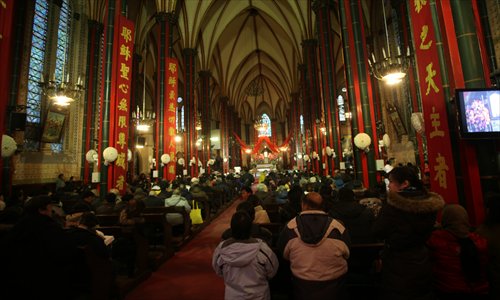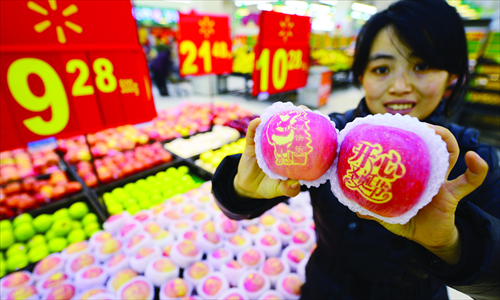Christmas crusade

Christians attend the mass for Christmas at Xishiku Church in Beijing on December 24, 2010. Photo: CFP
It is 6:30 pm and rush hour, as well as the busiest time for Zhang Hong's bakery in downtown Shanghai. The downtown areas of Shanghai, just like any other major Chinese city, have been decorated with Christmas trees, smiling Santa Claus faces and colorful advertisements for all kinds of Christmas gifts, bringing a strong festival atmosphere akin to that of the traditional Spring Festival.
One group of uninvited guests standing in front of her door attracts her attention. Three well-dressed young men who look like white-collar workers held up banners in their hands and distributed posters to passersby inviting them to attend a Christmas Good News Party held by their church.
"Although we look similar to those who distribute commercials, we are different in nature. What we deliver is Jesus, and we focus on people's souls," said one of the three.
While for many Chinese Christmas is a time for shopping and revelry, not everyone has decided to immerse themselves in the carnival of consumerism, but are instead seeking to restore its original meaning.
Good News
Christmas is, without doubt, becoming increasingly popular in China.
Although Chinese people may not know the origins of Christmas, this has not affected their enthusiasm for the holiday, as the real reason for its popularity is not religious beliefs but consumption. Economic factors have brought Christmas into the lives of millions of Chinese people.
However, with the rapid development of Christianity in China over the past 20 years, especially with the new phenomenon of worship services held in houses, office buildings and commercial spaces emerging in major cities like Beijing, Shanghai, Guangzhou and economically developed eastern coastal cities, more and more Chinese people are, for the first time, walking into churches for Christmas.
Bakery owner Zhang was among those who had no idea of the origin of this festival.
"It was the first time I had heard about a Christmas Good News Party after having done Christmas promotions for so many years. What is that?" Zhang asked.
In fact, the so-called Good News Party is a traditional Christmas event organized by churches during Christmas. However, the object of this event is not limited to church followers, but also welcomes those who never attended church.
Inviting non-Christians to churches during traditional Christian festivals has become a growing phenomenon in many emerging house churches in Chinese cities in recent years. The church will usually begin preparing the event months in advance and actively invite non-Christians to spend time together and understand the true meaning of Christmas.
Zeng Feili from Guangzhou is one of the participants of such activities. He was invited by a friend to attend a church activity in 2007 and later accepted the Christian faith. Two years later, he quit his job and joined a full-time evangelistic organization. Zeng and his companions will hold eye-catching signboards with slogans such as "The kingdom of heaven is closing and Jesus loves you," walking the streets of Guangzhou regularly and inviting passersby to come to church.
But Zeng told the Global Times that it was not easy for him to preach the gospel on the streets at the beginning. Not only did he have to endure people's contemptuous looks, with some crumpling up leaflets and throwing them away in front of his face, he also suffered the attention of the police and was frequently taken to the station for questioning.
Zeng said once when he distributed posters downtown, a man distributing advertising leaflets asked him how much he made every day by doing this. "I laughed and told him I made no money. It is voluntary because we are soldiers of Christ," Zeng said.

A vendor displays "Christmas apples" at a supermarket in Ji'nan, Shandong Province, on December 17. Apples have been connected with Christmas by vendors due to the shared pronunciation of "apple" and "silent night" in Chinese. Photo: CFP
Culture war
Zeng's church has some 1,000 congregation members, scattered across several groups in different areas of Guangzhou. The church hosts a Christmas party each year and all followers are encouraged to invite friends to come. Last year, more than 2,000 people were invited to attend their Christmas Eve event.
This year, Zeng's church began to prepare evening programs including singing, drama, personal sharing and sermons two months before Christmas in the hope of bringing a bigger audience.
In China, the Three-Self Churches, which are officially licensed, also hold various Christmas events during this time. However, because of space and number constraints, they are unable to meet demand. Non-Christians who want to participate in Three-Self Church Christmas events usually need to line up for hours to get a place.
A pastor from a Three-Self church in Pudong, Shanghai, told the Global Times that some 1,600 tickets for the church's Christmas choir concert this year were snapped up two weeks ago.
Meanwhile, a large number of unofficial churches, especially in big cities, are opening their doors to welcome more and more people who are interested in learning about how Christians spend Christmas.
Unlike Zeng's high-profile invitation, most church members choose to invite close friends and families privately. Guests usually have one simple purpose, which is to experience Christian meetings and Christmas celebrations in a new way.
Although Christmas activities organized by unofficial churches may be banned by the authorities, the government usually takes the attitude of acquiescence most times. "Guangzhou has more than 1,000 house churches that hold Christmas activities and police are short of hands to close them all down, and to do so would also cause undue public concern," Zeng said.
It is not only churches that are interested in attracting people to Christmas events, but also many businessmen. Although China is not a Christian nation, Christmas does have a significant meaning for the country. Almost every retail sector sees a dramatic surge in sales, prompting stores to try everything to attract consumers.
Most hotels, restaurants, bars and shops begin their festival promotion weeks ahead of Christmas. Christmas dinners in some entertainment venues in Shanghai will last until midnight while guests can enjoy a variety of dance, acrobatics or magic shows and participate in lucky draws.
One house church leader in the Shanghai Pudong New Area told the Global Times that they had booked the biggest ballroom of a nearby hotel for their Christmas event weeks ago, as their houses can no longer hold hundreds of participants.
In addition to strong domestic consumption, China also plays an important role in the worldwide Christmas market. According to a report from Yiwu customs authorities in Zhejiang Province, Yiwu had exports of more than 10 billion yuan ($1.65 billion) in Christmas supplies last year, covering nearly half of global demand. In fact, China has already become the world's largest Christmas supplies manufacturer.
True meaning
However, behind the consumption spree, few people may remember the original meaning of Christmas.
"People in China may feel surprised when they hear Christmas is about celebrating the birth of Jesus. Many foreign shops also have commercial promotions during Christmas, but you can see the influence of the faith on people such as joy and care that people hide in ordinary times. But in China, it is a purely commercial activity," said Wang Jun, a white-collar worker in Beijing who became a Christian after being invited to church during Christmas.
In Wang's opinion, the most important thing to remember while celebrating Christmas is to commemorate "the spirit of Christ."
"The spirit of Christ is the spirit of sacrifice which is the true meaning of Christmas culture, and it reminds us to love, comfort and encourage others as Christ loved us," he said.
But Professor Li Xiangping, director of Department of Sociology at East China Normal University, believes it should be treated rationally, whether it is someone who likes going shopping or pursuing their religious faith during Christmas.
"As long as it is within the law, we should respect everyone's choice," Li said.
Professor Yang Fenggang, director of the Chinese Religion and Society Research Center at Purdue University, believes that it is a natural phenomenon for Chinese people to celebrate Christmas in the era of globalization, and shows an open mind and acceptance toward modern Western civilization.
As for the commercial impact of Christmas, Yang believes it is acceptable since it is determined by the rules of the market economy and reflects the public's psychological expectations for the holiday.
"But on the other hand, for those who are busy eating and drinking on Christmas Eve, I'm afraid they will not understand the sacred meaning of Christmas," Yang told the Global Times.
"It is natural for churches to invite people to come during Christmas, which I think will also have a positive impact on China's social culture. More and more Chinese Christians who are passionate about their own culture recognize that the Christian faith can go beyond national boundaries and they are forming a unique Chinese culture in terms of celebrating Christmas," Yang said.